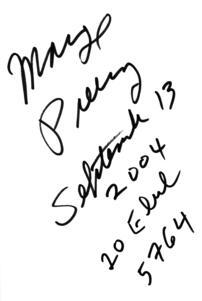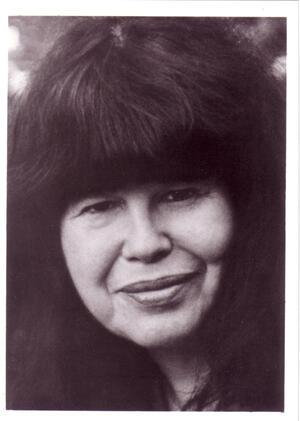Marge Piercy
The poems in The Art of Blessing the Day were written over a 20-year period. The first section contains poems about my mother and my grandmother, who was especially important because she gave me my religious education, and poems about two of my maternal uncles and maternal aunts.
The Chuppah (Marriage) section contains poems from my own wedding ceremony and a few that relate to marriage in general. A couple of them, particularly “The chuppah,” are often used in contemporary Jewish ceremonies.
Tikkun Olam (Repair of the World) contains poems of social relevance in a Jewish context.
Toldot Midrashim (Of History and Interpretation) includes both standard midrash – on Eve, Ruth, Abraham and Isaac, and Jacob – as well as poems about Jewish history, including the Holocaust. “The housing project at Drancy” and “Black Mountain” are from a sequence of poems I wrote when researching Gone to Soldiers in Europe. “The Altneushul in the old Prague ghetto” comes from doing research in Prague for He, She & It, as does “Returning to the cemetery in the old Prague ghetto.” “The thief” was inspired by a photograph at The Jewish Museum in New York.
Tefillah (Prayer) contains poems specifically written for a siddur (prayer book). I was part of the committee of mostly rabbis that created a siddur for Shabbat morning called Or Chadash.
Ha-Shanah (The Year) contains poems for the Jewish year starting with Shabbat, three poems for the High Holidays, a poem for Tu B’Shvat, “The New Year of the Trees,” followed by a number of poems for Passover. There is a poem for Rosh Hodesh (the new month/moon), considering it particularly as a women’s holiday. There are seven poems for items on the seder plate. All of the poems in this section, plus the ones I’ve written since then for Miriam’s Cup and Elijah’s Cup and other ritual items, as well as other parts of the seder, will be contained in the book I am writing about Passover for Schocken Press. In this section there are also poems for salt water and the Maggid section of the seder. Then we move on to a poem for Tishah b’Av. With the last two poems we mark a complete circle and come back to the High Holidays.
Marge Piercy is the author of 17 novels including the New York Times Bestseller Gone To Soldiers, the national bestseller The Longings of Women, and the classic Woman on the Edge of Time; 17 volumes of poetry; and the critically acclaimed memoir Sleeping with Cats. She has been a key player in many of the major progressive movements of our time, including civil rights, anti-Vietnam War, feminism, and most recently the resistance to the war in Iraq. Piercy also writes poetry and liturgy used in many synagogues and havurot, some of which is published in The Art of Blessing the Day: Poems with a Jewish Theme. She is currently writing a book about Passover for Schocken Press. In December 2005, she will publish her 17th novel, Sex Wars, which concerns censorship and control of women’s bodies in the turbulent period after the Civil War. Piercy gives readings, workshops, and lectures at universities, community centers, festivals, and retreat centers all over the U.S. and occasionally abroad.







